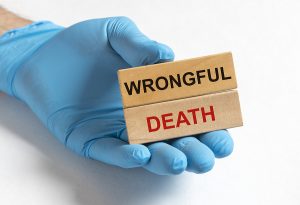When Is A Loss Of Life A Wrongful Death?
 Michael Babboni
Wrongful Death
In one sense, death may be the only truly “fair” concept in human life because no one, not the most innocent child, or most powerful rich man, is exempt. Death applies to everyone equally, but for many people, when it happens and how it happens can be a matter of just or unjust.
Michael Babboni
Wrongful Death
In one sense, death may be the only truly “fair” concept in human life because no one, not the most innocent child, or most powerful rich man, is exempt. Death applies to everyone equally, but for many people, when it happens and how it happens can be a matter of just or unjust.For example, most people will gracefully accept the death quiet death in bed of a loved one already in their 90s. That is a long, full life with many things accomplished and, to some, not much more to add. On the other hand, the death of an infant or a child, with so much time and potential accomplishments ahead, is considered unfair.
However, the most unfair type of death is the type that might not have happened at all, but for a preventable act of carelessness. In these instances, the law can help the surviving victims of such a death get some legally owed compensation. This is known as wrongful death. But what’s the difference between “typical” loss of life, and wrongful death, with legal compensation?
When Carelessness Becomes Tragic
Wrongful death is, in legal terms, a combination of result and intent. While most people don’t think death is a good thing, that doesn’t necessarily make a death a violation of the law. However, suppose human action, especially negative human action, is what causes a death. In that case, it may be time for the law to step in and decide if there are consequences.
Of course, the most common form of legal response to a death is a criminal charge followed by a jail sentence. This, however, is reserved for the most serious of criminal violations, the purposeful intent to deprive someone of their life, in other words, murder. However, there are other instances where human action is responsible for someone’s death, but the goal was not necessarily to end anyone’s life. In these instances, death is an unfortunate “side-effect” of someone’s actions, which may not always be considered a criminal act. Or at least not criminal to the same degree. This is the spectrum where wrongful death comes into play.
Civil Not Criminal Consequences
The majority of wrongful death incidents are legally treated as tragic accidents. This means that instead of criminal charges, a criminal record, and a possible jail sentence, all the “punishment” in a wrongful death case comes from financial compensation. In other words, people get sued for wrongful death, not criminally charged and punished for it.
However, a wrongful death lawsuit is still resolved similarly to a criminal court case. There are still lawyers representing both parties. There is still a jury deciding on a verdict, and there are still arguments and evidence presented to that jury to help them decide. The only difference is in the final outcome, if a “guilty” verdict is reached, and that is financially compensating the survivors with money, rather than sending the guilty party to jail.
Getting The Proof
As with a murder charge, wrongful death only results in a successful resolution in court if sufficient evidence can be presented. In this case, however, the goal is not to show deliberate intent to kill but to prove that risk was present that could result in death and that the person or organization responsible was aware of the danger but decided to ignore it, resulting in death.
This can be either a breach of “duty of care” for individuals, such as someone choosing to drive a car while drunk, or a “premises liability,” such as an amusement park being informed that a ride needs immediate repairs but choosing to let the ride operate that day, unconcerned about catastrophic malfunctions.
In any of these situations, what must be shown to the court is that the risk existed, the parties responsible were aware of that risk, but a deliberate choice was made to ignore that risk and take chances. Investigations must be conducted, evidence gathered, and all of this must be presented in court.
Mixing Civil & Criminal
Sometimes, however, wrongful death can be both a criminal and a civil act. Drunk driving, for example, is considered a criminal charge in Florida. If a death is involved, the charge of wrongful death may be in addition to others, such as vehicular homicide.
There are other rare instances where civil charges, like wrongful death, can be used in place of criminal charges. For example, in the infamous 1980s murder trial of football athlete OJ Simpson, he was found not guilty of the criminal charge of murder. However, the family members of the victim took Simpson to court for wrongful death, with intent to kill. Even though Simpson evaded criminal charges, the court upheld the civil lawsuit for wrongful death. He was financially responsible for compensating the victim’s family. If you have more questions, talk to a St. Pete lawyer experienced in personal injury and wrongful death.
